Key findings
The latest Australian Child Health Poll found that the vast majority of Australian parents support vaccination and keep their children’s vaccines up-to-date. Almost one in three parents still hold some concerns about vaccination, mostly relating to vaccine safety.
The poll found that many Australian parents are confused about whether to delay vaccines when a child has a minor illness with nearly half (47 per cent) incorrectly saying vaccination should be delayed in a well child on antibiotics.
This poll also suggested a worrying pattern of practice in Australian health care, with parents of one in six children who are not up-to-date with their vaccines reporting that they have been refused care by a health care provider.
Director of the Australian Child Health Poll, paediatrician Dr Anthea Rhodes said that while in the United States a clinician’s right to refuse care to an unvaccinated child has been a topic for some time, this poll suggests a worrying pattern of practice not previously identified in Australia.
“This concerning finding represents the parent perspective and further research is required on this issue to understand which health care providers are refusing care to these children and in what context.
“All children, regardless of their vaccination status, have an equal right to health care,” Dr Rhodes said.
This poll also found that a clear majority of Australian parents indicate support for strong policies to help get kids up-to-date on vaccines and preserve immunity in the community.
“While some medical professionals will argue that unvaccinated children can present a risk to other patients, we must remember that children aren’t making these choices about vaccination for themselves. By turning them away, health care providers not only deny health care to a child, but remove the possibility of educating parents and helping them to eventually choose to vaccinate,” Dr Rhodes added.
Among children whose parents reported them as not being up-to-date with their vaccines, children under six were most likely to be refused care by a health care provider (25 per cent), followed by 21 per cent of primary school-aged children and five per cent of teenagers.
The latest Australian Child Health Poll also found:
- The vast majority of Australian parents support childhood vaccination and keep their children’s vaccines up-to-date.
- 74 per cent of parents believe they should be informed about the number of children not up-to-date with vaccines in their child’s school, kindergarten or child care centre.
- Seven out of ten parents said that knowing the percentage of under-vaccinated children in a school or centre would influence their decision to send their child to that facility.
- Nearly three quarters of parents across Australia support a ‘No Jab, No Play’ policy, believing children who are not up-to-date with vaccines should be refused access to child care or kindergarten.
- Many Australian parents are confused about whether to delay vaccines when a child has a minor illness with nearly half (47 per cent) incorrectly saying vaccination should be delayed in a well child on antibiotics, and one in five (22 per cent) in a child who has had a local reaction to a previous vaccine, such as swelling or redness.
- Despite extensive medical research showing no causal link, one in ten Australian parents believe that vaccines can cause autism, and a further 30 per cent are unsure.
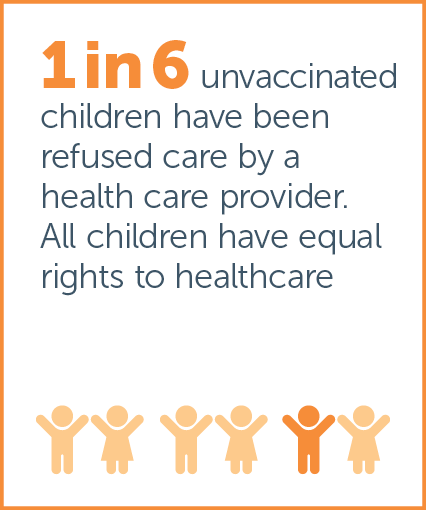
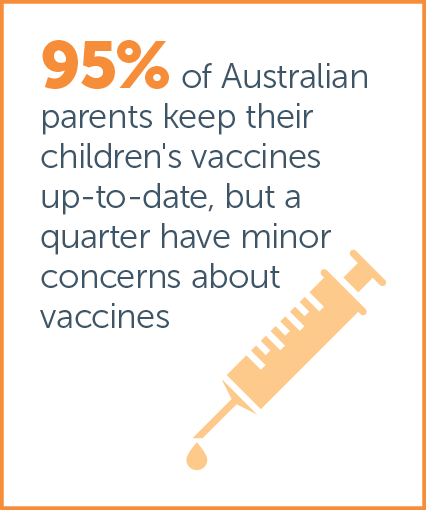
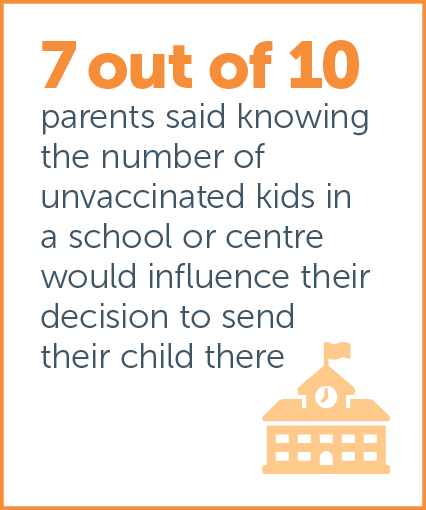
Poll report

Vaccination: Perspectives of Australian parents
Download report
Poll questions

Poll questions coming soon.
In the meantime, you can email child.healthpoll@rch.org.au

In the news
Sydney Morning Herald
Australian health services accused of refusing to treat unvaccinated children
The Guardian
Unvaccinated children being refused healthcare, Australian survey shows
The West Australian
WA parents most vary of vaccines
BBC World News
Australia considers childcare ban on unvaccinated children
ABC News Breakfast
ABC Radio National
Breakfast with Fran Kelly

Information for parents
General advice
- Raising Children Network – Immunisation in childhood
- Raising Children Network – Immunisation FAQ’s
- Better Health – Facts and misconceptions
- Melbourne Vaccine Education Centre
Government resources
- Immunise Australia Program
- Australian Immunisation Register
- ACT Health
- NSW Health
- NT Government
- Queensland Health
- Healthy WA
- SA Health
- Department of Health and Human Services, Victoria
- Department of Health and Human Service, Tasmania
Legislation
- Australian Government – No Jab, No Pay
- Victorian Government – No Jab, No Play
- NSW Health – Childcare requirements
- Queensland Health – Childcare requirement
Apps
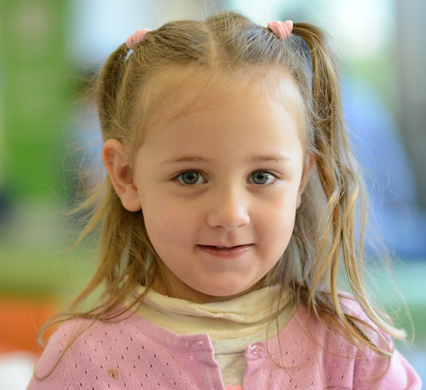


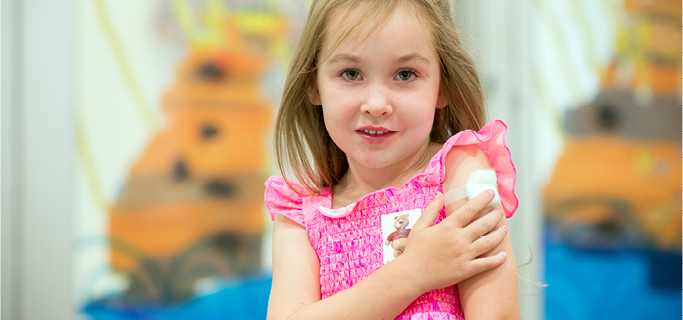
Thank you Dr Rhodes for those references….I’ve just read through the first one: National Centre for Immunisation Research and Surveillance of Vaccine Preventable Diseases (NCIRS) Myths and Realities: Responding to Arguments against Immunisation. A guide for Providers.
To ANYONE who believes and perpetuates the myth that vaccines cause no harm – here are three extracts from the government’s document:
“For example, MMR and MMRV vaccines are associated with an increased risk of a febrile convulsion between 7 and 12 days after the first dose of vaccine, compared with other periods. It is estimated that one extra child out of every 3,000 who receive MMR vaccine will experience a febrile convulsion during this period. ”
“Clinical trials of the currently used rotavirus vaccines did not identify an association between intussusception
and vaccination. However, studies since the vaccines came into use have identified a nine-fold increased risk of intussusception in the first seven days after the first dose of vaccine and a two-fold increased risk in the first seven
days after the second dose of vaccine. It is estimated that this increased risk would result in six additional cases of intussusception among every 100,000 infants vaccinated, or 18 additional cases per year in infants in Australia.”
“The ATAGI and TGA have reviewed available evidence and found that the benefits of rotavirus vaccination outweigh the risks associated with it, and a review of the risks and benefits carried out by the WHO reached the same conclusion.”
Peter
Just an observation. Every person (apart from me) who has commented on this piece, has taken a critical stance vis a vis the research. I would LOVE to know why it is that, apparently, everyday Australians are so ‘fired up’ about the dissemination of information that directly or indirectly suggests that we should be questioning the safety of vaccines. Vaccines are not safe. They may be ‘acceptably safe’ to gov/AMA/pharma, but that is not the same as ‘safe’. Look at how much is being paid out by the US compensation scheme for vaccine injury (and the reluctance of the Aus gov to set up a similar fund – despite the fact it was a clear recommendation of the committee in the No jab No play review last year). There can only be two conclusions to draw here.
1. Many Australians are NOT aware of the reality of vaccine-caused harm, or
2. All this anti-vaxxer hype is being orchestrated.
I would urge everyone to change the focus away from bullying parents into putting their kids in harm’s way and towards ‘encouraging’ the pharma companies to deliver vaccines with a lower risk profile.
BTW to ‘Alison’, ‘Roy’ and ‘Gavin’ below….if you want to see some truly poor research method, have a look at our government’s vaccine risk (adverse event) reporting data here https://www.health.gov.au/internet/main/publishing.nsf/Content/cda-cdi3604-pdf-cnt.htm/$FILE/cdi3604a.pdf and have a good hard think about these points:
– why anyone would set a research criteria that said that in order for a vaccine to be identified as causing harm, it has to be uniquely identified as the culprit
– and then make no effort to take a research cohort of individuals who receive their vaccines individually.
As things run right now, the research (deliberately or just accidentally?) under-states the risk of harm by allowing the research method to ‘miss’ adverse events, simply because in the schedule, vaccines are taken in groups.
Hi Dr Rhodes,
Thank you for the insights in your poll regarding vaccine safety. May I please ask a couple of questions arising from the poll and the article here http://www.abc.net.au/news/2017-03-08/children-without-vaccinations-being-refused-medical-care:-study/8334666
1. Does the framework of the research enable you to go back to those parents who said that their children were denied treatment because they were un-vaccinated? I ask because we saw a Dr in our local area who made it very clear to us that he was not interested in having our family join his clinic because we are unsatisfied with the safety of vaccinations and do not vaccinate our kids. (So I know that it happens). And also because the ABC article quoted the Australian Medical Association’s (AMA) Victorian president Lorraine Baker saying ‘she had never heard of any doctor refusing a child treatment’. And it might be helpful to demonstrate to the AMA that this is a reality that parents face. And to discuss the legality of such behaviour by Doctors.
2. May I also ask whether this quote in the ABC article is accurate: “Look, vaccinations work. They are safe. They have
saved many, many lives in Australia and across the world and we are pleased to see in the study that the vast majority of Australian parents do support vaccination and keep their kids up-to-date,” Dr Rhodes said. And may I ask, if it is accurate, why you made the statement, as you would know that vaccinations are not 100% safe. Whether or not you accept the autism links, the ‘adverse event’ reporting worldwide clearly indicates a level of risk, as does the level of funding paid to the families of injured children in the US from their fund set up explicitly for this known issue.
3. Finally, do you have a point of view as to why, rather than acknowledge the safety issue and address it with the pharmaceutical companies, the AMA and government, continue to bully parents into vaccinating their kids and misrepresent the risk of harm? Surely tackling the drug companies on the safety profiles would be the more ethical, and in the long term, more efficacious approach?
Thank you
Peter
Hi
What was the proportion of vaccinated children who were refused care?
Why were the unvaccinated children refused care?
Thanks!
Regrettably, the methodology used in the survey seems to be anecdotal at best. There doesn’t appear to be any attempt to follow up with the accused medical units, to find out whether to their knowledge refusal actually occurred; what might have been their reason for refusing treatment; or, since the child was presenting for medical attention, what circumstances surrounding his/her condition might have precluded treatment at that stage. I’m going by the methodology you sent us to, so perhaps all of this information is elsewhere?
Thanks for your comments Roy. I am very happy to answer any specific questions regarding the methodology of the Child Health Poll. Please feel free to contact me at child.healthpoll@rch.org.au. Regards, Dr Anthea Rhodes.
This appears to be a poorly conducted accumulation of data from other sources.
The “Detailed report” has little detail and its only any is as a source of links to the original studies.
This appears to be useless science which is taking away valuable resources from other parts of The Royal Children’s Hospital Melbourne.
Thank you for your comments Gavin. The Australian Child Health Poll provides original data from a representative sample of 2000 Australian parents about child health issues every quarter. The project provides new and valuable insights into the lived experiences of Australian parents. You can find more detailed information about the methodology of the poll here: https://rchpoll.org.au/australian-child-health-poll-survey-methods/. – Dr Anthea Rhodes
Interesting results, but I note the main take home message (and the one pushed in the media) is that unvaccinated children are being refused treatment. Yet the report states that 17% of the 4.8% children who aren’t vaccinated reported that they were refused care…..i.e. 0.82% of the children and 0.2% of unvaccinated children under the age of 6 are refused care. Less than 7 under 6 year olds and less that 28 kids all up. This is also purely anecdotal, and represents the PERCEPTION of the parent that a) they were refused treatment, and b) they were refused as a result of non-vaccination. There may be perfectly legitimate reasons for not giving treatment to a child – like not giving antibiotics when a child has a virus. This sounds like a real over interpretation of the data, and in a climate of anti-vaxxers looking for every opportunity to promote their views, going on the radio and indirectly supporting their position (‘there is very little risk of catching a communicable disease from an unvaccinated child in a GP waiting room’) is bordering on irresponsible.
Thank you for your comments Alison. The Australian Child Health Poll is intended to represent the parent voice and seeks to understand the lived experiences and perspectives of Australian parents in relation to child health issues. While the parent reported events of refusal of care to unvaccinated children by health care providers represent a small number of a marginal group, any child reportedly refused health care for any reason warrants further investigation. This is a well-established practice in the United States and provided context for asking this question of a nationally representative sample of Australian parents. These results represent the parent perspective and further research is required to explore the questions you quite rightly raise about which health care providers refused care and in what context.
In response to your query about figure 1, we have double-checked the numbers and cannot see an error; the data presented add up to 100%.
Thanks for the response, Anthea. I understand the limitations of this survey and that it represents unqualified views and perspectives of parents. I also understand that you can slice and dice these data in many different ways to get different perspectives or angles. However, with a highly contentious issue like childhood vaccination when clinicians and researchers already struggle to get their messages across, I find it really concerning you have chosen to report as a major outcome of this study that doctors ARE refusing to treat unvaccinated children which is simply not supported by these data (as far as is presented in the full report). Your data show that parents BELIEVE that they are being refused treatment, and believe that this is due to being unvaccinated. (Did you question all parents about how many had been refused medical treatment for their child, BTW?) Also stating that 1 in 6 unvaccinated children have actually been refused treatment seems to deliberately
over inflate the numbers (which are incredibly small as I highlighted in my comments).
Not surprisingly, this is what the media is running with, which only seems to present anti-vaxxers as somehow ‘victims’ of a ‘worrying trend’ – how < 1% of children possibly not getting treatment, possibly because they are under vaccination is a trend, is indeed worrying!!
In regards to Fig. 1 – when I added up all the % in the different categories (including 'other') it totals 88% – am I missing something?
Thanks again for your comments Alison. I’d be happy to speak with you further about the poll data and findings you’ve highlighted; please feel free to contact me by email at child.healthpoll@rch.org.au. Regards, Dr Anthea Rhodes.
Hi Alison, if you were one of the 17% who had been turned away from a clinic because you chose not to vaccinate your children, I don’t imagine you would consider 17% to be an ‘over interpretation of the data’.
I am also concerned at your that you consider it irresponsible that this poll in some ways ‘gives anti-vaxxers..an opportunity to promote their views’. (In fact it is the anti-anti-vaxxers like yourself who have jumped on the bandwagon. IMO.)
And I simply cannot understand why you and others choose to attack anti-vaxxers in the way that you do. Vaccines carry a level of risk. This is undeniable. If you do NOT know that vaccinations carry a level of risk, then there’s lots of data available and the quickest ‘proof’ is the existence of the HRSA or National Vaccine Injury Compensation Program, in the US. So, now you understand that there is risk…what happens when you’re asked these questions:
1. Is it acceptable for the AMA and government to say that vaccines are safe, when they know they are not?
2. Is it acceptable for the government/AMA to compel parents to put their children in harm’s way, in the ‘public interest’?
3. Assuming the answer to 1. and 2. is ‘no’ – is it acceptable to denigrate anti-vaxxers, or should you support them in their efforts to protect their children?
Or, let me put it another way.
If someone knocked on your door tomorrow and asked you to give your child some medicine.
And they said that the medicine was safe.
And you knew that taking that medicine involved an element of risk for your child.
And therefore, you KNOW the person is lying.
Would you give the medicine to your child?
Peter